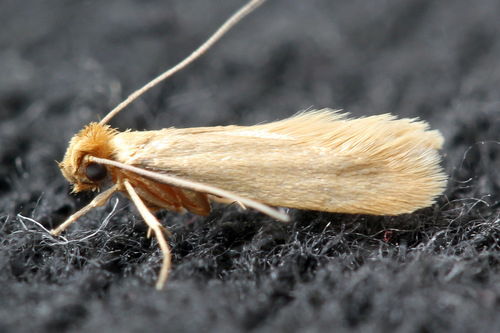There's something for everyone in the animal kingdom. Some people are drawn to cuddly home companions, some to powerful jungle predators, and others to fascinating undersea life. Isabel Novick likes clothes-eating moths, the little pests that feast on cashmere cardigans and polyester sheets with equal zeal.
Although one paper estimates the annual damage done by these tiny dust-brown flyers-typically no bigger than a grain of rice-at $1 billion in the United States alone, Novick (GRS'27,'27) says they could one day help us solve some of our most frustrating problems, instead of being one of them. The moths have evolved to digest not just fibers, she says, but also keratin, horsehair plaster, and even heavy metals like lead and mercury. A Boston University biology PhD student, Novick intends to find out how they do it-and if we can put their eating skills to good use.
In partnership with fellow graduate student Jasmine Alqassar (CGS'21, CAS'24, GRS'24), Novick spends her days in professor Sean P. Mullen's evolutionary genomics lab in the BU Graduate School of Arts & Sciences, where they are engaged in cracking the particular evolutionary puzzle posed by Tineola bisselliella, or the webbing clothes moth. The moths are basal in their phylogenetic tree, meaning they're an older evolutionary group from which a newer and greater variety of species later branched from.
The research is composed of three parts: In the first, Novick and her colleagues are annotating the Tineola bisselliella genome in the hopes of more accurately placing the webbing clothes moth within the Tineidae-or fungus moth-family tree. Second, Novick, Alqassar, and Mullen will perform a microbiome study with the goal of determining how the species is able to perform its signature move: digesting keratin and clothing fiber. Finally, Novick is contacting researchers around the world and asking them for samples of the webbing clothes moths they find to see whether the moths in American closets are genomically similar to those found in closets in Canada, Mexico, Chile, Nigeria, Australia, France, South Korea, and the State of Palestine.
While the idea of venerating this common parasite would cause most people to scratch their heads, Novick has no doubts about the importance of her research. "They have these cool behaviors and abilities that are rare, and that might actually be useful for us somehow," she says. "You have to love the Earth, love all its organisms-they are all helpful to us in some way."
The Brink spoke with Novick-who recently penned a defense of the moths for Entomology Today-about what inspired her research, where she hopes it will go, and why even a tiny, troublemaking moth deserves its moment in the spotlight.

This interview was edited for clarity and brevity.






